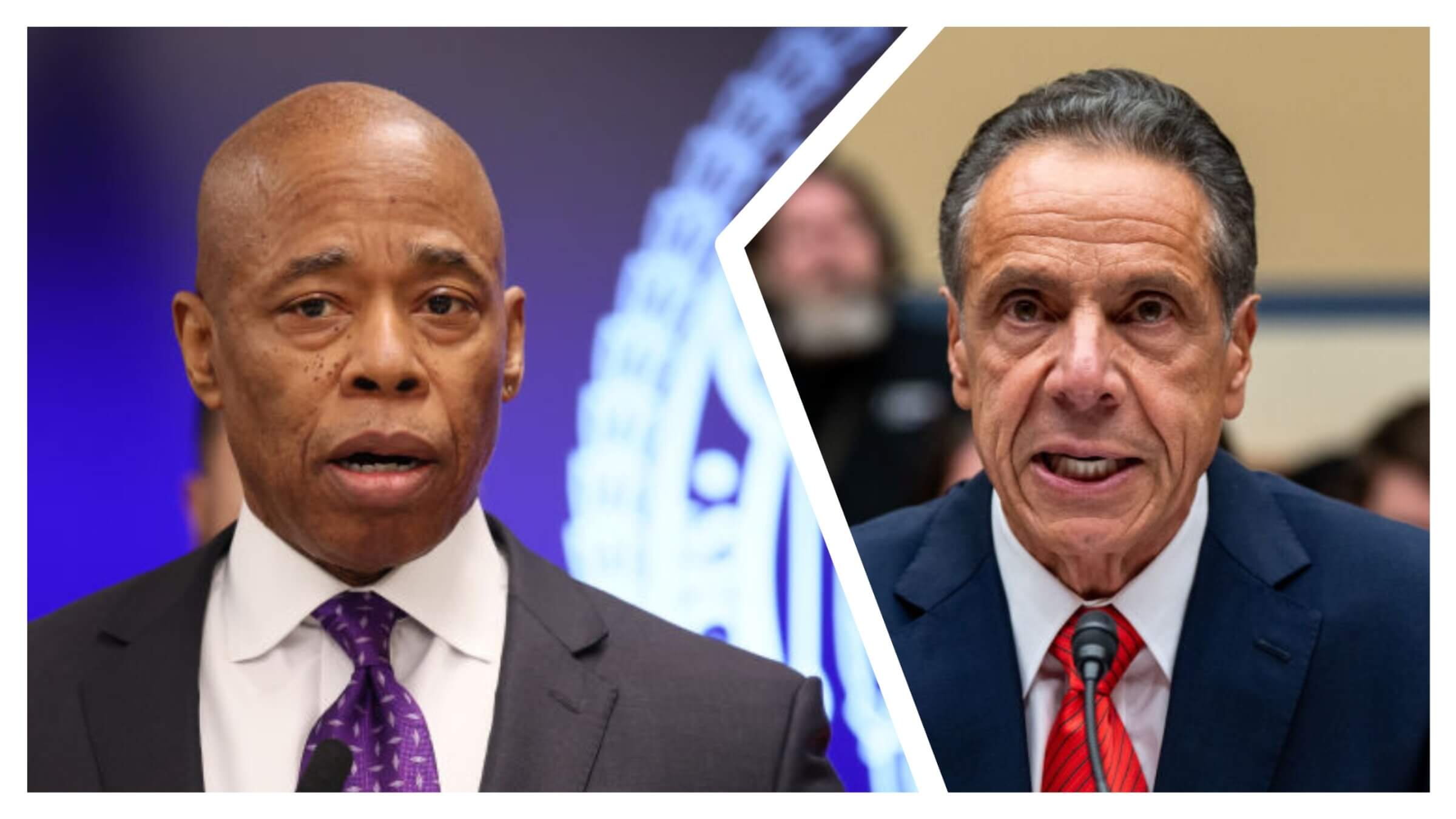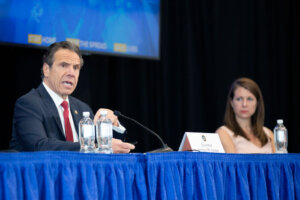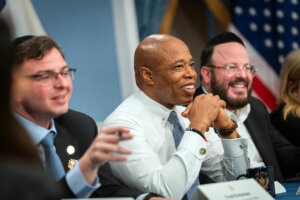Cuomo and Adams hope Jewish voters will fuel comeback in NYC mayor’s race
Andrew Cuomo and Eric Adams eye comeback with the help of Orthodox voters, a more conservative electorate

Collage of NYC Mayor Eric Adams and former NY Gov. Andrew Cuomo Photo by Michael M. Santiago and Kent Nishimura for Getty Images
A mayor fighting to keep his job and a former governor who resigned in disgrace are both trying to make a comeback in this year’s New York City mayoral race. In a heavily Democratic city, Eric Adams and Andrew Cuomo are counting on support from a more conservative, Republican-leaning electorate to secure the nomination in the June primary.
Both men have previously relied on the Orthodox vote — a group that often votes in blocs based on rabbinic endorsements — to win elections. In 2021, Orthodox voters played a key role in Adams’ victory, splitting their support between him and Andrew Yang in the first round of ranked-choice voting. During his three runs for governor, Cuomo consistently performed well in heavily Orthodox districts across the state. In 2014, he even outperformed his citywide margins in Brooklyn neighborhoods with large Haredi populations.
Adams and Cuomo have maintained close relationships with Orthodox leaders. But they have also appealed to the broader Jewish community concerned about pro-Palestinian campus protests since Oct. 7 and about progressive efforts to distance the city from Israel. Adams called himself a “modern-day Maccabi,” while Cuomo referred to himself as a “Shabbos goy,” both presenting themselves as defenders of the Jewish community amid rising antisemitism.
The NYC mayoral election
New York City is home to more Jews than any other city outside of Israel. Jews make up 12% of the city’s population, according to a recent Jewish Federation survey, and more than a third of those ages 18 to 29 identify as Orthodox.
A recent poll of 1,214 Democratic voters showed Cuomo leading with 38%, as he works to secure labor union and Jewish support ahead of a possible campaign launch. Adams trails at 10%, while state lawmaker Zohran Mamdani, a Democratic Socialist who authored a bill to penalize charities supporting Israeli settlements, is gaining momentum with 12%, putting him in a tight race with the incumbent mayor for second place. The poll was conducted by the Honan Strategy Group for Tusk Strategies via text and web from Feb. 22 to 23. It reports a margin of error of plus or minus 2.8 percentage points. Though the consulting firm is closely aligned with Cuomo, it is consistent with other independent surveys that all show Cuomo as the early frontrunner.
Also among the serious contenders in the June mayoral primary are Brad Lander and Scott Stringer, who are both Jewish; and State Sen. Zellnor Myrie, who represents the heavily Jewish Brooklyn neighborhoods of Crown Heights, East Flatbush and Park Slope.
The campaign for mayor formally kicked off Tuesday with five weeks of signature gathering to qualify for the ballot in the June 24 primaries. About two-thirds of New York’s voters are registered Democrats, making the party’s primary all but determinative of the November election.
The new system of ranked-choice voting, first implemented in 2021 to avoid run-off elections, presents a critical test of the Orthodox bloc’s power.
Voters are asked to delineate up to five choices on their ballots. If no single candidate wins 50% of the first-choice votes, the candidate with the fewest first-choice votes is eliminated and those ballots are reallocated to their voters’ second choices. That process continues until one candidate wins more than 50%.
Orthodox voters “can make or break” the mayoral election, “if unified,” said David Greenfield, a former Democratic city councilman who is now chief executive of the Met Council. “I think it’s fair to say they took Eric Adams over the top in the last election.”
Andrew Cuomo’s complex relationship with Jews

Cuomo, who resigned in 2021 following multiple sexual harassment allegations which he denied, has reemerged as a vocal pro-Israel advocate in recent years.
In 2023, months before the Oct. 7 attack and the subsequent war in Gaza, Cuomo formed a pro-Israel advocacy group — Progressives for Israel — to address waning support for Israel among Democrats and younger Americans. After Oct. 7, he launched ads supporting Israel and penned an op-ed decrying antisemitism on college campuses. He has also publicly defended Israeli Prime Minister Benjamin Netanyahu against the International Criminal Court’s claims of war crimes.
In a bid to highlight his longstanding ties to the broader Jewish community and invoke its affection for his father, Cuomo revived the “Shabbos Goy” term used by Mario Cuomo, the late three-term governor of New York who rooted his close relationship with the state’s Jews in his experience turning on the lights during the Sabbath for Orthodox families in his native Queens.
“The Shabbos goy can do the work that benefits both the Jewish community and the non-Jewish community” to speak out “first and loudest” against antisemitism, Cuomo said in 2023. Cuomo placed a mezuzah — made by the students of the Hebrew Academy of the Five Towns and Rockaway in 2018 — outside the Governor’s mansion in Albany.
He visited Israel three times as governor, and in 2016, he signed an executive order barring government business with any company that boycotts Israel “either directly or through a parent or subsidiary.”
Earlier this week, Rep. Ritchie Torres, a Democrat from the Bronx who has consistently clashed with the party’s left wing over Israel, endorsed Cuomo’s bid for mayor, highlighting the need for a tough guy to challenge the far right and far left alike.
“There’s a mayoral candidate who openly identifies with the Democratic Socialists of America, which celebrated the mass murder of Jews on Oct. 7,” Torres said, referencing Mamdani’s candidacy. Mamdani had alleged only days after Israel launched a military campaign against Hamas in Gaza that “we are on the brink of genocide of Palestinians.”
Cuomo’s relationship with the Orthodox community has been complicated by his handling of the COVID-19 pandemic. His executive order limiting religious gatherings during the pandemic disproportionately affected Orthodox neighborhoods in Brooklyn and Queens during the High Holidays and triggered fierce backlash. Many Orthodox leaders accused him of unfairly singling out their communities for enforcement. His administration’s handling of those tensions — including a top aide blaming Jared Kushner for sparking the Orthodox protests in Borough Park and blaming Donald Trump for incitement — left lasting scars.
“You can be as pro-Israel as you want, but Hasidim who vote as a bloc remember September 2020,” said one Jewish close ally of Adams, who requested anonymity because he wasn’t authorized to speak on the record. “To the extent they value toughness, they prefer Trump’s version over Cuomo’s.”
During his 2006 campaign for attorney general, Cuomo, who is Catholic, reportedly expressed frustration that he had to attend a Jewish outreach event during the holiday of Sukkot. “These people and their f—ing tree houses,” Cuomo said at the time, according to a book published in 2021. Rabbi Chanina Sperlin, the former head of governmental affairs for the Crown Heights Community Jewish Council who has hosted statewide elected officials for an annual event during Sukkot since 1998, said Cuomo never responded to an invitation to attend his sukkah celebration.
During the 2018 gubernatorial campaign, Cuomo poked fun at a Jewish consultant, Hank Sheinkopf, for his “ugly” dance moves during remarks at a Black church.
Cuomo’s spokesperson highlighted the former governor’s broad support for Jewish New Yorkers. “Governor Cuomo, just as his father before him, has been a staunch ally and lifetime supporter of New York’s Jewish community and of Israel — not just in words, but with actions,” said Rich Azzopardi, who has worked with Cuomo since 2012.
Leon Goldenberg, an Orthodox leader in Brooklyn, told Jewish Insider that Cuomo will need to apologize for his pandemic decision if he hopes to secure meaningful endorsements. “He wants to ignore it,” he said, “but it won’t be ignored.”
Eric Adams and his coalition with the Orthodox

Adams was elected in 2021 with support from Orthodox voting blocs and has maintained his popularity with Orthodox Jews since then with his strong pro-Israel stance.
As mayor, he resisted progressive efforts to distance himself from Israel after Oct. 7 despite criticism from some elected officials for his crackdown on pro-Palestinian protests at colleges and across the city last year.
This staunch position could be valuable for Adams if he stays in the race. “We had to make sure we sent a loud message” that the city would not tolerate attacks on Jewish residents or destruction of their property, Adams said in a recent roundtable with Jewish journalists. “Clarity was important. We did not send mixed messages.”
A significant number of Jews serve in senior positions in the Adams administration. They include Fabien Levy, deputy mayor for communications; Fred Kreizman, commissioner for community affairs; Edward Mermelstein, commissioner of international affairs; Jessica Tisch, the NYPD commissioner; Menashe Shapiro, deputy chief of staff; Lisa Zornberg, chief counsel to the mayor; Andrea Shapiro Davis, director of public service engagement; and Moshe Davis, the mayor’s Jewish liaison. Joel Eisdorfer, a member of the Satmar Hasidic community in Borough Park who chairs the mayor’s Jewish Advisory Council, stepped down last year as senior adviser, citing family reasons.
Frank Carone, a longtime adviser who was a bridge to Orthodox leaders and served as chief of staff for the first year of Adams’ term, is also reportedly in close contact with Cuomo.
Earlier this month, Adams came under fire for referencing Adolf Hitler’s Mein Kampf in pushing back against political opponents who accused him of striking a quid pro quo deal with the Justice Department to help implement Trump’s immigration crackdown in exchange for dropping federal corruption charges against him. He has resisted all calls to step down as they have grown louder.
What to watch

As the Democratic primary heats up, Orthodox voters could once again emerge as kingmakers as they did in 2021.
Adams and Cuomo are not the only candidates heavily courting Jewish leaders and independent voters.
In a recent interview, Zelnnor Myrie highlighted his deep connections with the Jewish community in Brooklyn, his advocacy for increased funding for hate crime prevention, and his suggestion to expand the state curriculum to include education on Jewish history. “I think the Orthodox community, much like the rest of the city, cares deeply about safety, but they have a particular sensitivity to this because they are visibly Jewish,” said Myrie, who was born and raised in Crown Heights, home to a significant Orthodox population. “This has been part of who I am as a New Yorker, growing up in and around the Jewish community.”
Scott Stringer, whose 2021 campaign was derailed by allegations of sexual misconduct that he denied, has never resonated strongly with the more conservative Haredi voters. But he said he has already started reaching out to the leadership and would likely rely on support from Jewish voters in the Upper West Side and Brownstone Brooklyn. Stringer spoke with pride about his preparations for the bar mitzvah of his elder son, Maxwell Elliot, which was held in December.
His successor in the comptroller’s office, Brad Lander, now the city’s highest-ranking Jew, will have a harder time appealing to the Jewish electorate given his progressive affiliation and stance on the Israeli-Palestinian conflict. He backed early calls for a ceasefire, has spoken out against the Israeli occupation of Palestinian territory, and in 2021, opposed the state comptroller office’s move to divest from Unilever, the parent company of Ben & Jerry’s, over the ice cream makers’ decision to end sales in the occupied West Bank.
But Lander said his goal is “to build a very broad coalition” that reflects the full diversity of New Yorkers across all five boroughs and to deepen his relationships, even with Jews who are more conservative than he is. “I try to be very clear in my positions and be consistent,” he said, “not to speak out of two sides of my mouth or say one thing to this community and another thing to the other community.”
















